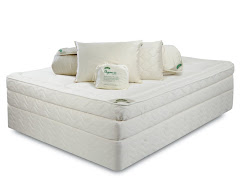Sleep is how your body repairs itself after a busy day. A 2005 poll by The National Sleep Foundation (NSF) found that more than half of us don’t get enough sleep, which could be putting us at risk for a slew of mental and physical illnesses. How do we ensure that we get enough quality sleep?
Maintain a Comfortable Sleep Temperature
Our bodies are 70% water and we maintain our optimal warmth by releasing minuscule amounts of vapor on the surface of our skin. When evaporation doesn’t take place, the moisture collects and becomes sweat. Likewise, when you step out of a warm shower into a cool room, the moisture chills you quickly. Wool naturally draws moisture away from your body, storing as much as 30% of its own weight without feeling wet to the touch. Cotton only absorbs 8%, synthetics less than 5%. Because wool is so good at drawing moisture from your skin to its core, your body regulates its own temperature more efficiently.
If you’ve ever woken up cold and clammy or hot and sweaty, you’ll understand how temperature swings can fuel heart palpitations. Studies show premature babies who sleep on wool have lower heart rates, which allows them to grow and develop at a faster rate than infants who sleep on other types of bedding. A resting heart rate and natural temperature regulation allows you drift into a deeper sleep and repair your body from the previous day. Natura's All Natural Mattress Topper provides a dreamy wool surface in a flash.
Body Support to Avoid Aches & Pains
The average person moves more than 50 times a night. Your brain constantly sends out signals to move as circulation is compromised. Wool buffers the body’s pressure points, providing cushioning support to relax muscles and ease joint pain. Studies show that wool reduces tossing and turning by as much as 75% because the crimped fibers gently support the body at its heaviest points. No pain signal equals less unnecessary movement – and waking – during the night.
Wool’s amazing springy-ness earned it a place in official baseballs (made with 150 yards of yarn) and piano hammers. And hospitals have long been providing long-term care patients with
wool toppers and bedding to prevent bedsores.
Congested?
Wool naturally repels dust mites, bed bugs and other common allergens because it lacks the one thing they need – moisture. While wool fibers store moisture at their core, it’s released directly to the environment while the outside stays dry. With synthetic fibers, moisture sits on the outside of the fibers and the fabric feels wet to the touch.
If sinus complaints and breathing difficulties keep you from getting the rest you need, it’s time to consider adding wool to your sleeping environment.
Be sure to check out our collection of therapeutic sleep systems and keep in mind that these mattresses are all made from natural organic materials-good for your family and good for the environment .








No comments:
Post a Comment